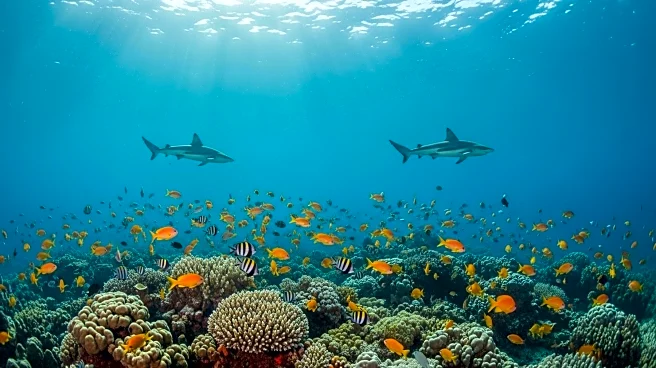What is the story about?
What's Happening?
Recent shark attacks in Australia have raised concerns about the frequency and fatality of such incidents. Mercury Psillakis, a surfer, was fatally attacked by a great white shark at Long Reef beach in Sydney. This incident has prompted scientists to explore ways to reduce shark encounters, although the risk can never be entirely eliminated. According to the Australian Shark Incident Database, there have been 1,285 shark incidents since 1791, with a noticeable increase in shark bites over the last two decades. Factors contributing to this rise include coastal population growth, climate change, and increased water sports activities. Despite the fear surrounding shark attacks, the actual risk remains low, with improved emergency responses and safety measures reducing fatalities.
Why It's Important?
The increase in shark attacks has significant implications for public safety and tourism in Australia. As more people engage in water activities, understanding and mitigating the risk of shark encounters becomes crucial. The fear of shark attacks can impact beach tourism and local economies reliant on coastal activities. Additionally, the management of shark populations and the use of technologies like drones and acoustic tags are vital for balancing human safety with marine conservation. Australia's approach to shark research and management could serve as a model for other countries facing similar challenges.
What's Next?
Australia is investing in advanced technologies to manage shark populations and reduce the risk of attacks. This includes the use of Smart drumlines, acoustic tagging, and drones for surveillance. The NSW government is also considering environmental DNA analysis to detect sharks. These measures aim to provide real-time data and predictive models to inform the public about high-risk conditions. The ongoing development of wearable deterrents and protective wetsuits further highlights the commitment to enhancing safety while preserving marine ecosystems.
Beyond the Headlines
The ethical considerations of shark management, such as the catch-and-kill approach in Queensland, raise questions about the balance between human safety and conservation. The indiscriminate bycatch in shark nets poses environmental concerns, prompting discussions on alternative methods. The integration of modern technologies and community involvement in shark surveillance reflects a shift towards more sustainable and humane practices. This evolution in shark management underscores the broader challenge of coexisting with nature while ensuring public safety.















